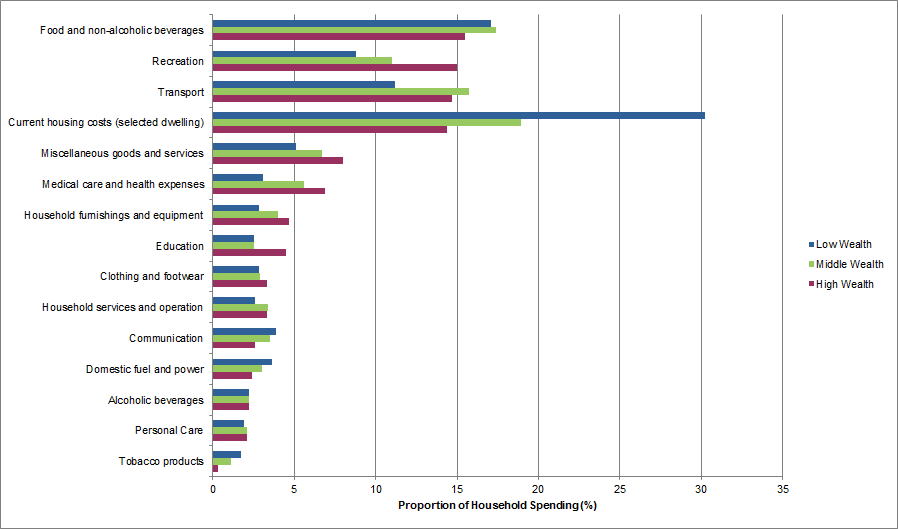There are three aspects to tax policy: simplicity, equity and efficiency. The issue of taxing food at a flat rate is one of equity as it occurs because of the greater proportional cost of food to the income of low income earners as opposed to high income earners. Basic food expenditure is a necessity, and consequently, a goods and services tax (GST) without an exemption for food is considered highly regressive.
There are different ways to address the regressive nature of a consumption tax. The most common method is to either exempt certain goods and services (generally those that are considered ‘necessities’) or tax them at a lower rate than other ‘luxury’ goods and services. Alternatively, a tax credit method could be used, whereby lower income taxpayers are reimbursed ‘for the tax paid on a minimal or essential level of consumption’. A further solution would be to provide low income families with a direct payment. Carlson and Patrick argue that taxing certain items at a lower or zero rate is ‘probably the most frequently used method of alleviating the regressivity of a consumption tax’.
Five OECD member countries apply a zero-rate exemption (GST-free) to specific food items. These are Australia, Canada, Mexico, Ireland and the United Kingdom. However, most European countries apply reduced rates to various food items or exempt them from GST (or value added tax (VAT) as it is called in many countries) as input taxed supplies.
The concern for equity
The interaction between low income earners and consumption taxes has been the subject of many research reports and other publications. A 2007 study looked at the average European Union consumption shares for household groups divided into quintiles (quintiles are from the lowest income to the highest income numbered from 1 to 5). It showed that consumption patterns are rather similar for most sectors, except for food and utilities like electricity and heating. For those sectors, low income consumption shares were on average almost twice (1.83 and 1.71 times) the corresponding high income shares. The conclusion was that retaining reduced GST rates on food would also benefit high income households but be comparatively better for low income households because they spend a significantly larger share of their income on food.
Food is a significant proportion of the cost of living for all households in Australia. Figure 1, the table below extracted from an Australian Bureau of Statistics survey for 2015-2016, shows that, after housing costs, people with the lowest wealth spend the largest proportion of their household income on food and non-alcoholic beverages. People with the highest wealth actually spend most on food, but this is only slightly more than they spend on recreation, with transport and housing costs their third and fourth highest areas of expenditure.
Figure 1: Proportion of weekly household spending on goods and services, by low, middle and high wealth, Australia 2015-16
(Source: Australian Bureau of Statistics, 2015)
Political importance
Apart from equity reasons, it is also likely that food is zero-rated in Australia, Canada, Ireland, Mexico and the United Kingdom because the potential political cost of increasing the consumption tax on food would be too high. In Australia, food was considered one of the most essential GST-free categories in terms of equity by some groups, with the Australian Democrats refusing to support the GST legislation until the Liberal-National Coalition agreed to its GST-free or zero-rated status. Several years before Australia introduced a GST, the Australian Council of Social Service (ACOSS), business groups and other peak bodies met to discuss tax reform. They agreed in principle to the introduction of a broad-based consumption tax that would replace the existing wholesale sales tax and many of the existing State taxes, such as Financial Institutions Duty, Debits Tax, Payroll Tax and Franchise Taxes. Throughout the conference, ‘emphasis was placed on the need to protect those on social security and those on low wages from any adverse changes’.
Australia was one of the last of the OECD nations to introduce a GST. Although the Asprey Report recognised the need for a broad-based consumption tax back in 1975, it was not introduced until 2000. The idea of a GST was first mooted by John Howard (then Federal Treasurer) in 1980. The GST was so politically unpalatable to the Australian public that it took the Liberal-National Coalition close to two decades to introduce it. As noted above, the eventual GST system was only able to be passed by the Australian Senate (upper House) on the basis that food was GST-free. The political situation was so sensitive that it was also agreed that any change to the GST rate or base would require the unanimous support of the State and Territory governments, the endorsement of the Australian Government and the passage of relevant legislation by both Houses of the Australian Parliament.
Conclusion
It seems clear that low income households suffer when there is tax on food, due to the necessity to consume this item. As they are already disadvantaged, increasing consumption tax on essential food would impact on these households to a disproportionate degree. Furthermore, it is politically unpalatable that basic food items are taxed, therefore it is unlikely that this will change.
This article is based on Martin, F 2020, ‘The case for specific exemptions from the goods and services tax: what should we do about food, health and housing?’, eJournal of Tax Research, vol. 18, no. 1, pp. 99-123.






As one who observed the GST negotiations closely at the time, I would just add one nuance: as I recall, the Australian Democrats did not insist specifically that basic food be given a zero exemption. Their concern was that the package overall was regressive, and had to be made much fairer before they would vote for it. As Professor Martin points out, there are a variety of ways this could have been done, but the Government and the Democrats quickly agreed that exempting basic food items was the simplest way to do it. You could confirm this with their negotiators, Andrew Murray and John Cherry.